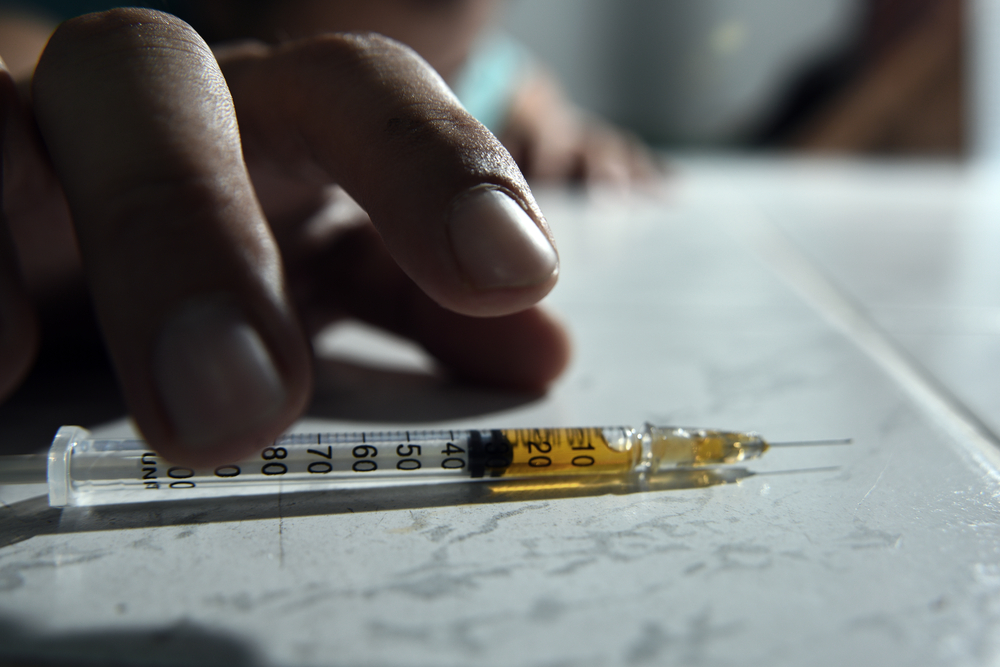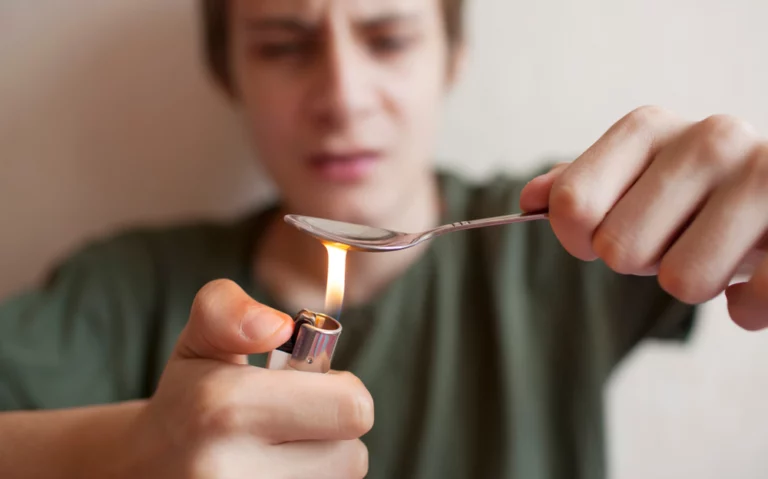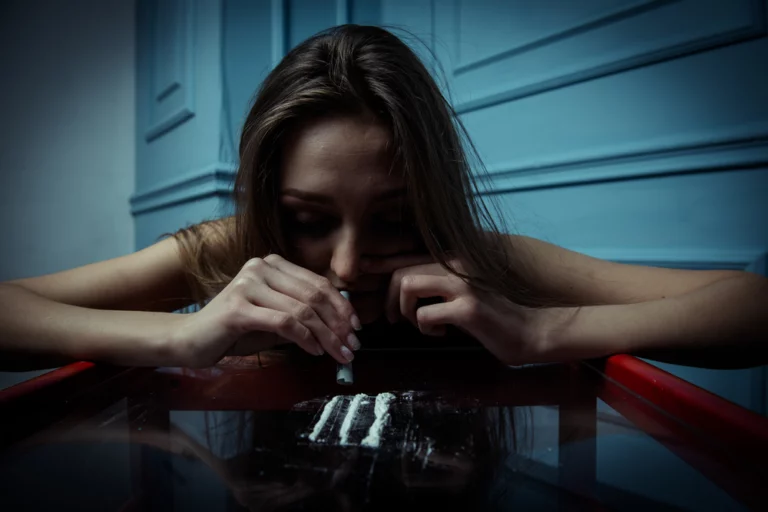Is Heroin a Stimulant or Depressant?
Many people ask the question: is heroin a stimulant? Heroin is among the most widely abused street drugs in the world. It gives a strong, euphoric high that hooks a person into continuous drug-taking behavior. Those unfamiliar with heroin often wonder whether it is a stimulant or a depressant. Today, we will discuss heroin’s drug classification in order to better understand its function and addiction.
What is Heroin? An Overview
Heroin is a very addictive opioid and Schedule I substance that produces significant pleasurable cognitive effects. According to the law, there are currently no accepted medical applications for heroin and there is a high probability of misuse. Heroin is created from morphine, an opiate substance derived from certain poppy plant species. Heroin is accessible in every region of the United States, despite the fact that poppy plants are typically cultivated in Southeast and Southwest Asia, Columbia, and Mexico.
Heroin may be purchased on the street under various names such as H, horse, smack, and hell dust. Heroin typically appears as either a white or brown powder. This substance may be mixed with cornstarch or baby powder, or it may be converted into a black tar substance. Heroin, in its various forms, may be snorted, smoked, or injected intravenously.
Is Heroin a Stimulant?
Heroin, an illegal opioid listed in Schedule I, is not a stimulant. Instead of arousing the central nervous system, heroin subdues it. Heroin is a central nervous system depressant. It slows down, or suppresses, activity in the central nervous system, just like other opioids. By binding to the brain’s opioid receptors, heroin causes these effects. It also affects the brain’s reward system, leading to a desire to take the drug and, in some cases, causing addiction.
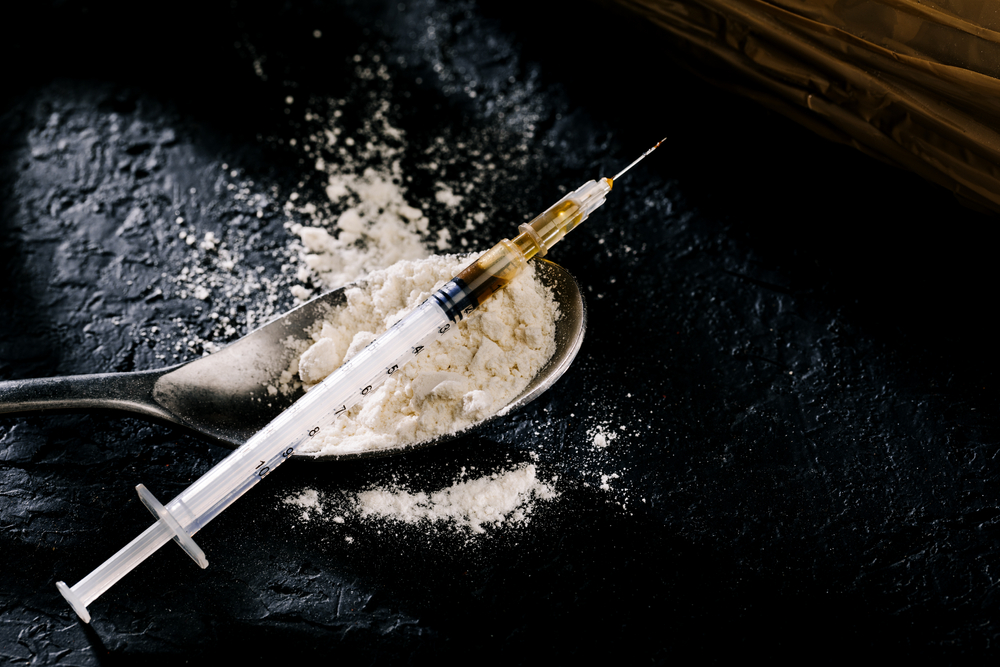
What are the Effects of Heroin?
The effects of heroin abuse vary based on the individual, the duration of use, the quantity of heroin consumed, the presence of other substances, and the individual’s makeup. Signs of heroin addiction include:
- Depression
- Mood swings
- Aggression
- Fatigue
- Poor memory recall
- Dizziness
- Avoidance or self-isolation
- Weight loss
- Poor hygiene
- Skin sores
- Track marks
- Constricted pupils
- Excessive sweating
As the drug is abused for longer periods of time, the symptoms become more severe. Common dangerous side effects of prolonged heroin use are:
- Infection around injection sites
- Liver disease
- HIV
- Hepatitis B/C
- Pneumonia
- Collapsed veins
- Kidney disease
- Stroke
- Heart attack
- Septicemia
- Seizures
- Respiratory depression
- Overdose
- Death
How do People Use Heroin?
There are several ways to use this drug. Each route of administration has unique signs of use and risks. Methods of heroin administration are:
- Injection – Heroin must be liquefied and dissolved prior to injection in order to ensure that it can be absorbed into the bloodstream. When injected, the heroin is mixed with water, heated, and dissolved so that it may be administered properly. Because of shared needles, individuals who inject heroin are at risk of contracting HIV/AIDS, hepatitis B, and hepatitis C in addition to other transmissible diseases. Injection may also cause abscesses, track marks, and other infections in select soft tissues.
- Smoking – Heroin users heat the drug (black tar heroin) on a piece of aluminum foil or the top of a soda can then use a pen or straw to inhale its vapors. This is known as ‘chasing the dragon’. Smoking heroin can hurt lung function, cause breathlessness, and cause severe and repeated asthma attacks. It can also trigger leukoencephalopathy, a serious condition of the central nervous system’s white matter.
- Snorting – Users prepare for insufflation by drawing the drug into lines on a mirror or other hard surface. A straw, hollow pen, or rolled dollar bill is then used to inhale it into their nasal cavity through their nostrils. This method is very invasive and may result in chronic nosebleeds, collapsed nasal passages, and irreversible septum damage.
Is Heroin Addictive?
Heroin is a highly addictive substance. Regular heroin users often become tolerant to the drug, requiring higher and more frequent doses to achieve the desired effects. Substance use disorders (SUDs) occur when continued heroin use results in health problems, and poor performance at work, school, or home, resulting in substance use disorder. A SUD may range from mild to severe, with addiction being the most serious condition.
Users who suddenly quit using heroin may experience severe withdrawal symptoms. Withdrawal symptoms—which may begin as early as a few hours after the drug was last taken—can be severe and include:
- Muscle aches
- Restlessness
- Vomiting
- Nausea
- Cold flashes
- Excessive sweating
- Tremors
- Severe cravings
- Insomnia
- Diarrhea
Heroin Overdose: What it Looks Like
According to the National Institute on Drug Abuse, 13,165 people died from heroin overdoses in 2020 alone. This graph shows the dramatic increase in heroin-related deaths within the last two decades.
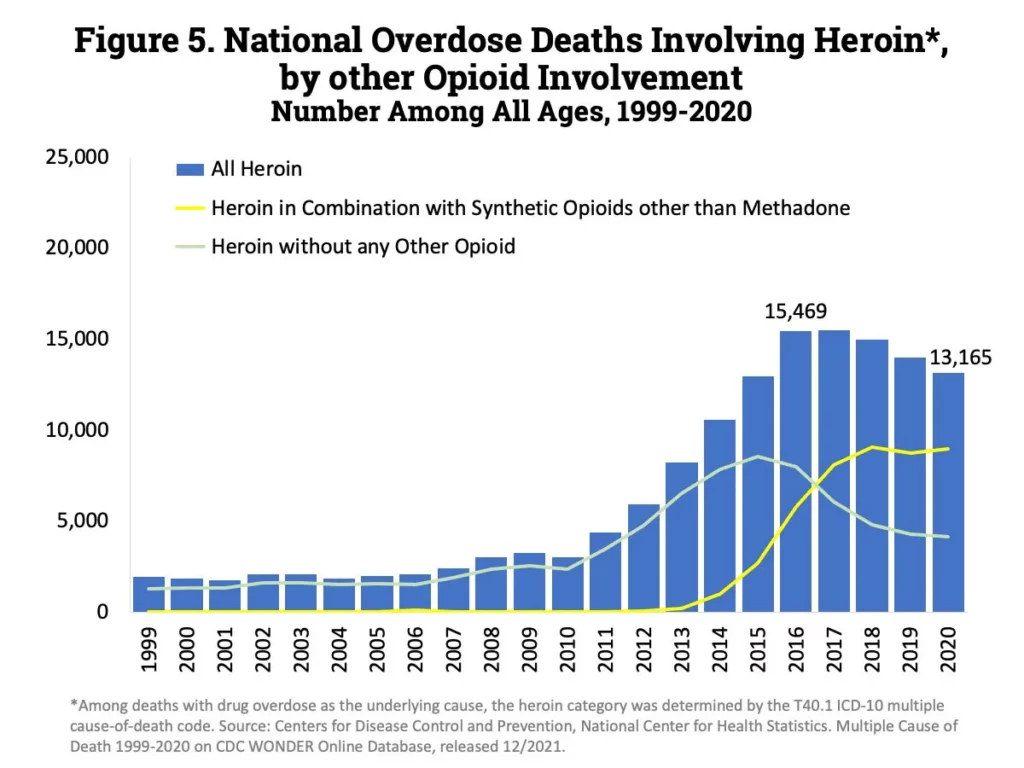
High doses of heroin, like other opioids, bind to opioid receptors in the nervous system, stopping pain signals, producing a euphoric sensation, and slowing down the nervous system. During an overdose, heroin may slow down the nervous system to a dangerous degree, shutting down critical functions. Medical personnel must act quickly if serious medical complications or death are to be avoided.
Small pupils, unconsciousness, and reduced respiration are the most apparent indications of an opioid overdose. An individual may come and go from consciousness, or they may even fall asleep, making it difficult to rouse them. Because of the effect of the drug on the autonomic nervous system, which regulates unconscious activities, drugs slow down the body’s breathing or produce shallow breaths. Slower heart rates, changes in body temperature, and blood pressure, among other things, may also be impaired.
Anyone who misuses opioids or mixes them with other drugs can suffer an opioid overdose. However, certain risk factors can significantly increase your chances of experiencing an overdose, including:
- Having an opioid addiction
- Mixing heroin with alcohol or other depressants
- Using heroin after a period of sobriety
- Having a medical condition
- Injecting heroin intravenously
If someone has taken a drug and displays heroin overdose symptoms, you should call 911 immediately. Even if a person consumes a different drug, an opioid may have been added to it. Stay with the individual until emergency assistance arrives, even if you’re not a medical professional or doctor. You can help to reduce harm while you await emergency assistance.
It is dangerous if someone is lying on their back or face down while vomiting. Aspirating vomit may cause them to choke. If they are unable to sit up, move them into a safe position and keep the person’s airways clear by removing items such as pillows, scarves, and other objects.

Heroin Addiction and Recovery
Various therapies, including medication-assisted treatment and behavioral therapies, are effective in helping people quit heroin use. Personalized care is important in matching the client with the most appropriate treatment plan.
Buprenorphine and methadone are two medicines that bind to the same opioid receptors in the brain as heroin, but with less strength, thereby reducing cravings and withdrawal symptoms. Naltrexone, on the other hand, blocks opioid receptors and prevents other opioid medications from functioning. The National Institute on Drug Abuse determined that both a buprenorphine/naloxone combination and an extended-release naltrexone formulation are similarly effective in the treatment of addiction once treatment has begun.
Contingency management and cognitive-behavioral therapy are two behavioral therapy methods that can help heroin addicts. With cognitive-behavioral therapy, patients can be educated to alter their drug-use expectations and behaviors, as well as effectively manage triggers and stress. These behavioral therapies are especially effective when combined with the medication-assisted treatments mentioned above.
Louisville Recovery Center is Here for You
Heroin addiction can affect anyone at any time. If you or a loved one is currently experiencing addiction, Louisville Recovery Center’s customized services and treatment programs can assist you. We believe that anyone can recover from addiction. Our experts will assist you in developing an addiction treatment program that suits your needs.

Common treatment programs include:
- Intensive Outpatient Programs (IOP)
- Full-time Addiction Treatment on campus
- Aftercare Services
We can assist you in overcoming heroin addiction. Contact a treatment specialist at Louisville Recovery Center today for more information. You are no longer alone in your struggle against heroin addiction. We will get through it together.

